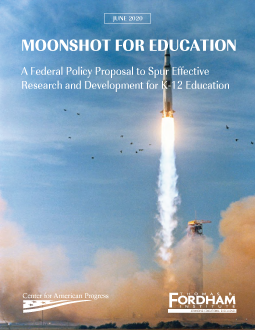In dozens of fields, federally-supported research and development translates into new ideas, technologies, and actions. Why not in education, particularly as the Covid-19 crisis makes it abundantly clear that our educational systems are severely lacking innovative technologies that could have improved the resiliency and flexibility of our classrooms and facilitated a nationwide shift to remote instruction?
Part of the problem is meager funding. The research dollars that flow through the U.S. Department of Education are woefully insufficient to yield major breakthroughs. Then there’s the problem of slipshod coordination across agencies with overlapping missions that are engaged in education-related R & D. And then there’s the challenge of translating research into practice.
In this policy proposal, we and the Center for American Progress offer a constructive solution: a bold R & D initiative dedicated to improving student outcomes for students of all backgrounds.
Key features of the proposal include:
- A focus on developing open-source solutions to education challenges that are unlikely to receive sufficient attention from private or philanthropic sources.
- A director-led board or group of advisors to set research priorities, this comprising both experts and shrewd representatives from vital education constituencies that range from teachers and students to analysts and local leaders.
- The ability to flexibly recruit experts as program managers for the duration of a project’s investment.
- Funding from Congressional appropriations, to be supplemented with philanthropy, private firms, and states and localities.
For more thoughts on the need for this endeavor, particularly in light of the ongoing crisis, see this accompanying blog post.




